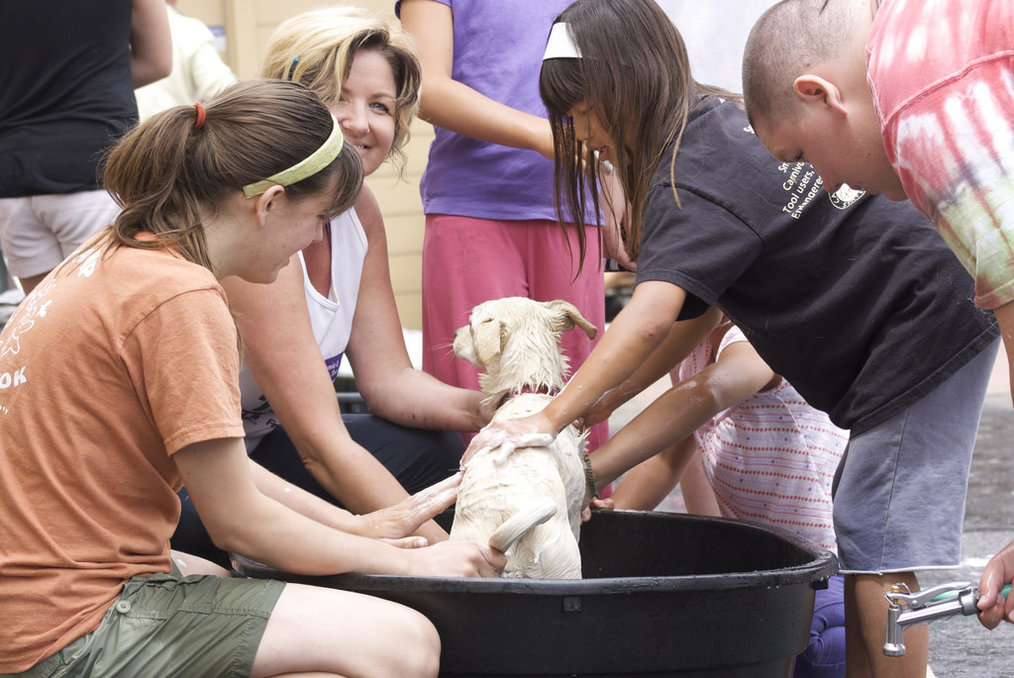The Pros and Cons of Volunteering Abroad With a Local Organization
Thinking about volunteering abroad? Picking the right organization and program for your trip is important! Learn the pros and cons of volunteering abroad with a local organization vs a multinational program provider.

When it comes to volunteering abroad, a few large organizations (like Greenheart Travel, Rustic Pathways, and IVHQ) run different volunteer programs running in various countries.
When you check out their sites, you'll see advertised opportunities to do everything from working with school children in Kenya, assisting in an elephant sanctuary in Thailand, or doing community outreach in a health center in Nicaragua. These providers have fostered relations with the local community, setting up volunteer placements and accommodations. For this, they charge a set fee for their services, including orientation, in-country support, and perhaps even excursions in the area.
Assuming that the volunteer abroad provider you choose is a responsible placement organization, you could both have a pretty good time and give back to the community abroad by going this route. You can feel confident that your experience will be positive both personally and for the community -- after all, these providers didn't become popular for no reason! For many, this is the exact setup they're looking for, making the price well justified.
Read more: How Do Communities Abroad Benefit from International Volunteers?
Volunteering directly with a local organization can offer you opportunities otherwise unavailable while providing more effective solutions to the target population.
However, it's important to remember that program providers are often businesses. They need to make money. They may still have good intentions and be making improvements in communities abroad, but there is a competing factor. When you volunteer with a local nonprofit organization, the program isn't looking to make a profit, just fund the projects.
As you research your options, also take a minute to look into local organizations. Though less advertised, volunteering directly with a local organization can offer you opportunities otherwise unavailable while providing more effective solutions to the target population. There are several significant reasons why you should consider volunteering with a local organization. These reasons can be broken down into two categories, the benefits for the local population and the benefits for the volunteer.
Benefits for the Local Population

First off, by volunteering with a local organization, the program is more likely designed specifically for the target population and the most pressing issues in the region. Many local organizations are run at least partially by locals. By personally investing in bettering the community, the organization is more likely to work effectively to achieve a meaningful impact.
One of the biggest challenges that face nonprofit organizations is context. It's not enough to have a great development idea that has worked in the past. It is equally important to determine if this idea would be culturally relevant and appropriate, of use, and if you can garner community buy-in. When you have someone from the community who can give meaningful insight into the wants and needs of the people and cultural practices, it is more likely that the program will succeed.
Another benefit to the local population (and should be of importance to volunteers) is a better understanding of where the organization's donations and program fees are going.
With local organizations, you can see the extent of the organization and its programs. You meet the staff, the beneficiaries, and, in some cases, the donors. You're more likely to achieve a clear idea of the breakdown of the costs of running the organization and how your fees fit in than with a large, multinational organization.
Unlike a provider program which may have staff in the West in addition to their in-country staff, local organizations are mostly (if not wholly) made up of staff on the ground whose salaries are paid based on local wages. When your program fees go directly to the staff, you are helping boost the economy, as many of these countries rely on tourism as a source of income.
One of the biggest challenges that nonprofit organizations come up against is context.
Finally, with local staff running the day-to-day, it also helps you know that the organization will be more sustainable and maintained after your departure. Yes, having volunteers from abroad can be helpful, but for a project to truly thrive and have a lasting impact, there needs to be continuity with local staff and community engagement.
Benefits for the Volunteer

One of the most impactful takeaways from a volunteer experience is cultural understanding. While you are bound to get this to an extent with any program, joining a project run by a local organization means you will be surrounded by a majority of local staff. Local organizations also tend to take on fewer volunteers at a time.
When the organization is running in a specific location, you can be confident that all the focus will be directed at the target population. Everything centers on the projects with which you are involved and the community it's benefiting.
With a local organization, you will have greater opportunities for flexibility within your day-to-day. Like a small start-up, these local organizations have a small staff, and most involved are often taking on a variety of different responsibilities. If done right, this could apply to you as well.
Want to get experience with budgeting or understand the finesse required for fundraising? Looking to teach but also develop curriculum? Interested in the logistics of managing a team? You will have the opportunity to learn about the different aspects of program management, international development, your field of expertise, and likely much more. It's not only an excellent way to build up your resume, but it's also important field experience that you can draw from in future academic and work scenarios.
As a volunteer, one of the most impactful takeaways from the experience is cultural understanding.
Of course, volunteering with a local organization can sometimes be cheaper or -- if you're lucky -- even provide a small living allowance. If you've done most of the groundwork in independently setting up your volunteer project (either once you arrived in country or before departure), you won't be paying a placement fee. You will still have to cover airfare, visas, and living expenses, but you may be able to negotiate some of this from your host organization.
If you've chosen to volunteer abroad for longer, there's even a chance your position may include a stipend. In this scenario, your position is more or less a job, so be prepared to treat it as such.
Cons of Volunteering with a Local Organization

While volunteering with a local organization has benefits that their international counterparts don't, there is, unfortunately, more room for corruption. If you choose not to go through a vetted and reputable program provider, be prepared to do a lot more independent research (which, by the way, is precisely the kind of preliminary legwork these program providers are doing for you. If your time and peace of mind are more important than your money, think about this.
When researching, be wary of any organization that is unwilling to show you their books. There should be 100% financial transparency in these kinds of organizations. They should want to run a background check on you and interview you via Skype or in person. Ask other NGOs nearby about the organization. Post on expat forums and check their online presence to get as much information as possible.
Then, when you do talk with your host organization, be willing to ask difficult questions, especially when working with children (and use these tips for avoiding an orphanage abroad scam.)
Secondly, local organizations don't usually have major donors and are reliant on volunteer fees and small donations to run their programs. Thus, your organization may not have the resources that another more prominent program provider or development organization might have, which may or may not affect what you get from the experience.
When volunteering with a local organization has a pros that their international counterparts don't, there is unfortunately more room for corruption.
As always, it’s important to do your research! First, understand what it means to be a responsible organization. Then speak with these staff members of the organization as well previous volunteers. Ask questions that help build expectations of how your skills will be utilized. Ensure you’re getting a realistic, unbiased view, read reviews to hear what other volunteers thought (since no organization will have you speak with someone who didn’t enjoy their experience).
There's a Vast World of Volunteer Abroad Opportunities
When you're looking into volunteering abroad, the first options you'll encounter are the more extensive provider programs. Look into these programs and what they offer. But don't be afraid to check out local organizations either.
They may have more specific opportunities you are looking for and, in some cases, are doing more for the community than a larger provider would be able to. It will take more time in research and developing your plan, but that's no reason to shy away. Reach out to the organization, check reviews of volunteer abroad organizations, and take the leap!



